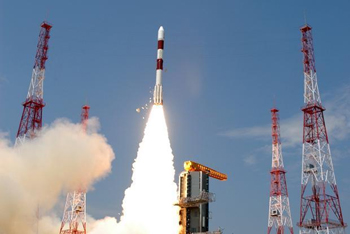New Delhi, June 30: Exactly at 9.52 am, the rocket - Polar Satellite Launch Vehicle-C23 (PSLV-C23) - standing around 44.4 metres tall and weighing around 230 ton tore into the bright morning skies with orange flames fiercely burning at its tail.
The rocket port is around 80 km from Chennai.
The rocket's main luggage is the 714 kg French earth observation satellite SPOT-7.
Piggybacking on the main luggage are the four small satellites viz: 14-kg AISAT of Germany; NLS7.1 (CAN-X4) and NLS7.2 (CAN-X5) from Canada each weighing 15 kg; and the 7-kg VELOX-1 of Singapore.
Prime Minister Narendra Modi, Andhra Pradesh Governor ESL Narasimhan, Chief Minister N. Chandrababu Naidu, Union Minister Venkaiah Naidu, space scientists and other invitees at Indian Space Research Organisation's (ISRO) rocket mission control room intently watched the rocket's upward flight with one way ticket.
This was the first space mission of the Modi-led National Democratic Alliance (NDA) government.
The five satellites were launched under commercial arrangements that Antrix Corporation - ISRO's commercial arm - has entered into with the respective foreign agencies.
ISRO officials are hoping that the agency's around 20 minute crucial space mission will turn out to be a grand success.
As per the mission plan, the rocket first spit out its heaviest and costliest luggage - SPOT-7 - around 18 minutes after the blast off.
India had launched another French satellite SPOT-6 in 2012. The latest in the SPOT family of satellites is the SPOT-7.
The ejection of SPOT-7 will be followed by AISAT (German), NLS7.1, NLS7.2 (both from Canada) and VELOX-1 (Singapore).
Starting from 1999 India has launched 35 foreign satellites till date using its PSLV rocket. The successful launch of five satellites Monday would take the tally to 40.
India began its space journey in 1975 with the launch of Aryabhatta using a Russian rocket and till date, it has completed over 100 space missions including missions to moon and mars.
Earlier:
Isro all set for launch of five foreign satellites today
Chennai, Jun 29: The Indian Space Research Organisation (Isro) is all set to launch its commercial rocket carrying five foreign satellites with all the parameters before the launch progressing smoothly after the countdown.
 “The countdown for the launch of rocket Polar Satellite Launch Vehicle (PSLV-C23) on Monday at 9:52 am is progressing smoothly”, a senior Isro official from Satish Dhawan Space Centre (SDSC) at the Indian Spaceport in Sriharikota, said.
“The countdown for the launch of rocket Polar Satellite Launch Vehicle (PSLV-C23) on Monday at 9:52 am is progressing smoothly”, a senior Isro official from Satish Dhawan Space Centre (SDSC) at the Indian Spaceport in Sriharikota, said.
The 49-hour countdown for the rocket’s flight started on Saturday morning at SDSC, about 100 km from north Chennai.
“The propellant filling operation of Reaction Control Thrusters (RCT) of the first stage, in the four-stage core alone vehicle, was completed. Propellant filling operation of the fourth stage was also completed”, the official added.
This would be PSLV’s 27th flight when it would launch SPOT-7, a French Earth Observation Satellite into a 655km Sun Synchronous Orbit. PSLV-C23 will carry the 714 kg SPOT-7 as the main payload. Also, the 14 kg AISAT of Germany, NLS7.1 (CAN-X4) and NLS7.2 (CAN-X5) of Canada each weighing 15 kg, and the seven kg VELOX-1 of Singapore are being carried as co-passengers.
The launch was re-scheduled to 9:52 am from 9:49 am owing to the probability of space debris getting in the way of the launch vehicle.
Modi in Chennai
Prime Minister Narendra Modi is scheduled to witness the rocket launch. This is the first space mission of the NDA government led by Modi.
Meanwhile, Modi landed in Chennai Airport en-route to India’s rocket port in Sriharikota in Andhra Pradesh. The special aircraft in which Modi was travelling landed after a 40 minute delay owing to bad weather.
Modi was given a warm reception by Tamil Nadu and Karnataka Governor K Rosaiah, Chief Minister J Jayalalitha, Union Ministers M Venkaiah Naidu and Pon Radhakrishnan.
Later, he left for Sriharikota in a helicopter to witness the launch of PSLV on Monday morning.
Isro Chairman K Radhakrihna gave a brief presentation on Indian Space Programme to Modi at SDSC.





Comments
Add new comment